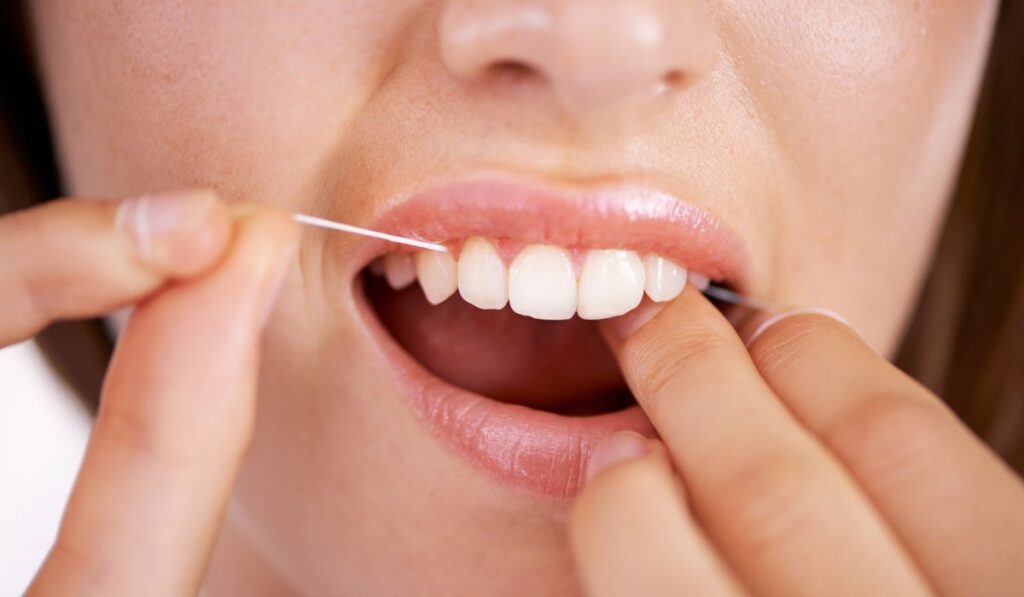Flossing can be painful at times, and this pushes many people to avoid it completely. However, flossing also contributes to healthy teeth and gums, and it’s just as important as brushing your teeth. So, why do your teeth hurt when flossing, and what can you do about it?
Initially, your teeth may hurt while flossing, but the pain should fade away once you start flossing regularly. Consult a dentist if the pain persists even after an extended period of flossing. It may be due to cavities, sensitive teeth, or improper brushing technique.
Once you get the hang of flossing, you’ll be glad you stuck with it. Let’s take a closer look at the reasons why your teeth might hurt while flossing and what you can do about it.
What Causes Pain While Flossing?

If you’re new to flossing, then it’s likely that you’ll experience some pain, bleeding, or even swollen gums after flossing. Initially, it might cause you distress, but that’s no excuse to stop flossing your teeth!
Flossing is an essential part of a good oral hygiene routine. Flossing daily leads to less tooth pain, and your gums won’t have any bleeding, swelling, or redness. If you have sensitive teeth or gums, flossing will make them healthier.
Flossing also protects your mouth from cavities, plaque, bad breath, and bacteria, and it removes the food stuck between your teeth and along your gum line.
The pain experienced while flossing can be very annoying, but you just need to be patient initially. That said, if you consistently experience pain while flossing and it shows no signs of decreasing, there may be some other reason behind the pain.
Here are possible reasons why your teeth hurt after flossing:
You Don’t Floss Regularly
If you brush your teeth twice daily but only floss once in a blue moon, then you’re not doing it right. Flossing on alternative days or once a week gives no real benefit to your oral health.
Flossing rarely is likely the reason your teeth hurt, and your gums may become irritated since your teeth aren’t used to it yet. Like brushing your teeth twice a day, you need to develop a proper daily flossing routine.
Dentists recommend flossing at least once or twice a day. Avoid flossing more than twice a day, however, as it can have the opposite effect on your health. You should also floss after eating, preferably in the morning after breakfast and at night before going to bed.
If you don’t develop a flossing routine, your teeth and gums will continue to hurt every time you floss.
You Have a Cavity
If you floss regularly without pain and suddenly start experiencing pain when flossing, then you may have a cavity. Cavities can cause pain during and after flossing.
Eating sugary foods and not brushing your teeth regularly can result in a cavity. If you’re flossing regularly, but the pain isn’t subsiding, you’ll have to check whether you have a cavity.
If you experience pain in a specific tooth, then inspect it carefully. If your tooth is rotten or you have tooth decay, it’s probably best that you stop flossing, especially around the tooth with a cavity.
You’ll need to consult a dentist to get a deep cleaning of your mouth and a filling to treat the cavity.
You Have Sensitive Teeth
Sensitive teeth and gums can definitely hurt a lot when you start flossing. This pain also goes away with time if you floss regularly, but if the toothache persists, it means that your enamel is probably damaged.
The enamel is the outer protective layer on your teeth. If your enamel is damaged, you’ll experience stinging pain during and after flossing. If you experience tooth irritation or pain after eating or drinking something hot or cold, it’s a sign of sensitive teeth.
If you’re going through any of these problems, stop flossing before you damage your teeth any further. Visit your dentist to find alternatives to clean sensitive teeth without damaging the already thin enamel.
You’re Brushing Too Hard
Brushing your teeth is the foundation of good oral health, but it can also be harmful if you don’t do it properly.
If you’re brushing with force, it’ll damage your teeth and gums. Moreover, flossing after brushing your teeth harshly can cause premature wear and tear of your gums and enamel.
You should use a good quality toothbrush with soft bristles, like one of these extra soft toothbrushes from Nimbus (on Amazon). Keep in mind having a soft toothbrush doesn’t mean that you can brush your teeth harshly, and you’ll still damage your enamel if you overdo it.
Make sure you don’t grip your brush handle too hard. Using a featherlight grip will help you maintain a healthier approach while you brush.
How to Prevent Pain While Flossing

If you don’t have dental problems such as worn-out enamel, gum recession, cavities, or tooth decay, then you need to continue flossing and do it regularly.
However, don’t get too enthusiastic about flossing or overdo it. There’s no need to floss more than twice a day. Also, you need to be patient while flossing and avoid applying too much pressure or rubbing your teeth too harshly.
Also, try to develop a consistent flossing style and floss by moving from one tooth to another, so you don’t skip any teeth.
Also, check that you’re using the right toothbrush, especially if you have sensitive teeth. You need to buy a toothbrush that’s comfortable, and always floss after brushing your teeth to cleanse your mouth thoroughly.
When to See a Dentist
If you experience constant pain or irritation after flossing, consult a dentist immediately. Your dentist will check for problems such as tooth decay, cavities, gum recession, damaged enamel, and other dental problems that may be causing pain while you floss.
Your dentist will also recommend a certain type of floss if you have sensitive teeth.
Even if you don’t have any dental problems, you should still visit a dentist every 6 months. Only a dentist can inspect your mouth properly and detect any oral problems.


